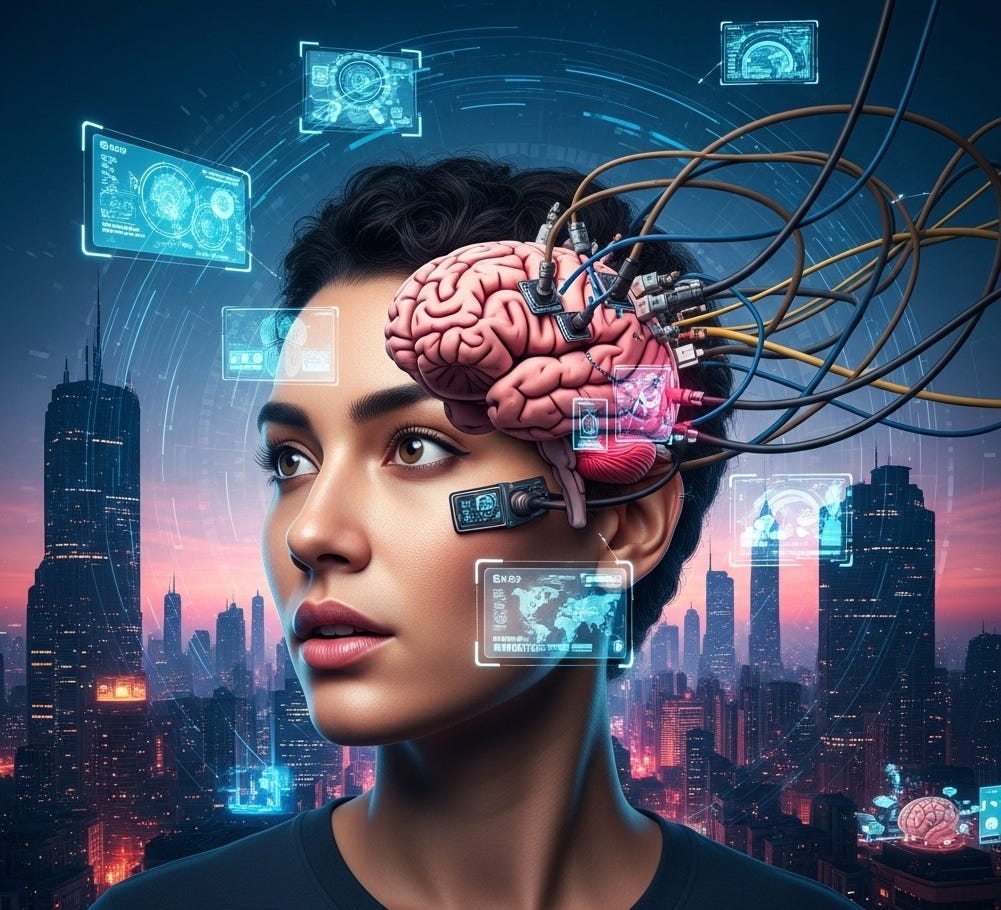Unplug and Think: Reclaiming Your Mind in a Tech-Saturated World.
Are we trading true wisdom for digital convenience? It's time to remember what it means to truly think. Isn't it?
Lately, I find myself growing less and less impressed by (what I call) anti-social media and the latest technology. In fact, I'm slowly but surely turning myself off it. As automation grows smarter, I can't help but wonder if we're becoming, well, a bit duller through lazy thinking. It feels like we're losing our grip on the ability to truly think for ourselves, increasingly swayed by the relentless hum of social media, keyboard warriors, politics, and, well, you know. Don’t you?. Remember when our brains actually did stuff? Like, really knew things, deep in our bones? I do, vaguely. It was before we all got swept up in the glorious, glittering current of tech nirvana. Somewhere along that digital superhighway, we’ve become, well, gloriously lazy through indoctrination and learned helplessness, I reckon.
We stopped bothering to memorise phone numbers. Birthdays? Anniversaries? Nah, mate. Those became as relevant as an old phone book covered in dust. Turns out, all this shiny technology and seamless convenience quietly mugged us of something profoundly human. We went from being the stars of our own lives to just… spectators. Honestly, my phone probably knows more about me than I do. Which, let's be fair, is a bit concerning.
But here's the kicker: we didn't just declutter our mental filing cabinets. Oh no. In the sacred name of "convenience," we traded away some serious gold. We waved goodbye to intentionality. We kissed connection farewell. And, perhaps most tragically, we gave up a chunk of our wisdom. It's like we took our brains to a pawn shop and got a cheap, plastic, fairground-type trinket in return.
Now, the late, great neurologist Dr. Oliver Sacks (yes, I’ve actually researched!) was a bit of a memory marvel himself. He was absolutely obsessed with how our squishy grey matter defines us. He famously said, "Memory is identity. I have no past, no story, no self without memory."
So, let’s think of our memory as our own personal, slightly chaotic cartographer. It’s the wonky, hand-drawn map of everywhere we've been and everything we've stumbled upon. These days, we outsource that job to apps like Uber, letting some disembodied voice guide us to that slightly dodgy kebab shop. Our digital calendars and contact apps ensure we actually show up at the right place, at the right time, and don't accidentally try to have a meeting with our cat. And don't even get me started on AI reminding us who said what at the last Zoom call – because, clearly, we can't be trusted with such critical information.
On paper, this all sounds like a massive upgrade, right? However, there is a price for all this digital hand-holding, this ceaseless pursuit of convenience. It’s a bill that's going to take generations to tally up. But from where I’m standing, it feels like we've already lost a chunk of our identity. And something else, too, something squishy and important.
Take London cab drivers, for example. Before the Waze app swooped in like a benevolent, GPS-enabled deity, these brave souls had to cram 25,000 streets into their heads. A study back in 2008 found that these legendary navigators actually had larger hippocampi – that's the brain's VIP lounge for memory and spatial awareness. Their skill literally made their brains bigger. It’s like their brains were hitting the gym, while ours were chilling on the sofa, stuffing our gobs with crisps.
Nobel Prize-winning neuroscientist Eric Kandel discovered that memory actually rewires the brain. When we learn something, our minds literally change shape. Which begs the rather uncomfortable question: if we're not bothering to memorise anything anymore, what exactly is doing the shaping these days? Is it TikTok algorithms? The collective wisdom of cat videos?
With all this tech doing the heavy lifting, our brains aren't exactly breaking a sweat. And over time, like an unused bicep that's more flab than fab, our brains can start to atrophy. This mental "lack of exercise" is, I suspect, quietly fuelling the rather grim explosive growth in dementia and other neurological disorders. The number of adults with dementia is projected to double by 2060. So, enjoy that frictionless life now, because your future self might not remember it.
Intellect vs. The Smart-Arse Next Door.
You see, back in the day, your intellect was basically measured by how much you’d crammed into the old grey matter. Your brain was a human hard drive, albeit one prone to crashing after too much alcohol. Today? Intellect is less about what you know and more about how fast you can Google it or get AI to spit out an answer. It's the difference between being a walking encyclopaedia and having a really fast Wi-Fi connection.
As Thomas Sowell wisely (and rather pointedly) put it, "Intellect is not Wisdom."
Wisdom, on the other hand, is a whole different beast. It's about good judgment, a practical understanding of life's curveballs, and the uncanny ability to make sound decisions based on experience and a deeper, more nuanced insight. Knowing how to access information is only half the fun. Real wisdom is knowing that a tomato is a fruit, but also knowing it has no business being in a fruit salad. See? Wisdom.
Our memory isn't meant to be exorcised; it's meant to be exercised. Think of it as a garden that needs constant tending, a bit of pruning, some aggressive weeding (especially of those nagging doubts), and, of course, the joyful cycle of reaping and sowing. If we don't look after it, we'll end up with a mental patch of weeds and very few brain-berries.
But then automation waltzed in, and like a clumsy elephant in a china shop, it changed everything. Technology and convenience, bless their cotton socks, inadvertently cheapened thoughtfulness, memory, and intentionality.
Sure, it's lovely to get in excess of 100 random cakes, party popper, and balloon emojis on Facebook on your special day. But let's be brutally honest: there's something utterly impersonal about an automated social media message. Especially when it’s conjured up by a Facebook data centre in rural America that automatically broadcasts your birthday to anyone with a pulse and an internet connection.
Seriously, when did we decide these things were no longer worth the effort of committing to memory? As Simone Weil so perfectly put it, "Attention is the rarest and purest form of generosity." And right now, our generosity tanks are consistently looking a bit empty, aren't they?
Not so long ago, people would boast about having a thousand Facebook "friends" or five hundred followers. These were people who, realistically, added absolutely no value, offered no meaningful conversation, and were merely fuel for the roaring fire of ego and popularity. Now, of course, it's all about being an "influencer"—whatever the hell that actually means in this increasingly ego-driven, self-important, false world that's, once again, powered by the false god of technology. Just be your own ‘influencer’ and keep it real!
The truth is, reclaiming our ability to think for ourselves isn't just about personal growth; it's about our collective sanity. We should be the undisputed masters of modern technology, not its unwitting slaves. Because if we continue down this path, particularly in the wild west of social media, where algorithms dictate our thoughts and trends rule our emotions, things are going to get dangerously, ridiculously, and perhaps irreversibly, out of control. Don’t you think? Well, that is, providing you’re still capable, of course.



